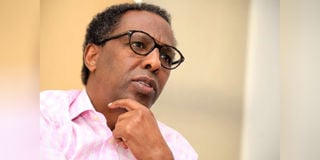Premium
LSK objects to Supreme Court's ban on Ahmednasir

Lawyer Ahmednasir Abdullahi.
What you need to know:
- Former LSK vice chairperson Carolyne Kamende said the Supreme Court's decision to disqualify Ahmednasir from practising before it was illegal.
- Ahmednasir said it was the second time in his career that the courts had denied him an audience for demanding the removal of corrupt judges.
The president of the Law Society of Kenya (LSK), Eric Theuri, has expressed his displeasure at the Supreme Court's ruling on senior lawyer Ahmednasir Abdullahi.
In a statement, Theuri said the decision to disqualify Ahmednasir from appearing before the Supreme Court was not supported by any law.
Theuri said if the decision was allowed to stand, it would set a dangerous precedent that courts could disbar anyone they did not like.
“The Law Society will not allow its statutory mandate to be encroached upon by the court and will seek an immediate retraction and apology from the Supreme Court,” Theuri said.
He added that every person has a constitutional right to a lawyer of their choice and that in this matter the court cannot violate a consumer's rights by dictating who should appear before it.
“The court has no legal right to bar an advocate duly authorised by the Law Society to practise law. The decision has no basis in law, is illegal, irregular and paints the court as a purveyor of injustice.”
The LSK president also says that the court's decision violates the principle of the right to be heard, which is a basic element of any fair decision, and that at a time when the judiciary is in the crosshairs, the decision justifies the attacks on the judiciary.
The same voice was echoed by former LSK vice chairperson Carolyne Kamende, who said the Supreme Court's decision to disqualify Ahmednasir from practising before it was illegal, unconscionable and unconstitutional.
“The Supreme Court cannot condemn Senior Counsel unheard. Article 47 guarantees him a fair hearing. The Supreme Court seems to have been exercising an administrative action. Senior Counsel ought to have been heard before a decision was made. Decisions of the Supreme Court are binding on the other courts. Does this mean that he will not practise law?” Kamende said.
According to the court, the decision was based on Ahmednasir's endless attacks on judges and the institution, making him unfit to appear before the same judges in whom he has no confidence.
“In view of the foregoing, it is the decision of this court, that henceforth and from the date of this communication, you shall have no audience before the court, either by yourself, through an employee of your law firm, or any other person holding brief for you, or acting pursuant to your instructions,” the court said.
Reacting to the court's decision, Ahmednasir said it was the second time in his career that the courts had denied him an audience for demanding the removal of corrupt judges.
“The first time was in 2000 when I was ejected from court and told not to come back because I presented a paper at the Law Society of Kenya annual conference calling for the reconstitution of the High Court and the Court of Appeal.”





